


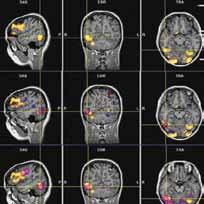







dear alumni and friends,
happy new year! i would like to welcome you to the newly redesigned issue of Endeavors! it has been over a year since the reorganization of the College became official and we have been hard at work moving forward. we are well into the academic year and i become increasingly excited about the great strides the College has been making.
The College-wide reorganization, the product of over two years of collaborative work, has brought about a renewed sense of purpose to provide the best education possible to our students, and through them affect education research and practice in maryland and throughout the united states. our alumni are proofpositive that College graduates are committed, knowledgeable and passionate change agents in their respective fields. we hope to continue this trajectory by shaping our programs to be relevant, interdisciplinary and innovative. i invite you to learn more about the reorganization and some exciting results emerging on page 8.
in this issue, we profile two programs that are informing literacy intervention in children through both research and practice that place our students out into the community to make a real impact on the lives of young students. The first is an example of how technology is being leveraged to increase our understanding of
one example of how researchers in the College are examining fundamental issues
Clinic, is the capstone experience for students in our master’s in Reading Education
and was inspired by the incredible passion for reading that was being nurtured in young students, who
reluctant readers or behind their peers in reading fundamentals.
i also want to highlight our efforts on integrating internationalization and globalizations in all areas of the College. our office of international initiatives is working tirelessly on infusing issues of globalization into the curriculum, both in the College and in maryland schools, and developing ways to promote a global understanding in our students through experiences, interactions, and learning. in this issue, we highlight one of our study abroad experience, El Salvador’s Children: Risk, Poverty and Education
december marked the end of the university of maryland’s capital campaign, Great Expectations. i want to personally thank all of our supporters who helped us reach our fundraising goal. one of the most important roles that i have as dean is working to secure funds to support our research, programs and most important, students. you can learn more about our campaign success, as well as learn more about how you can leave a lasting legacy at the College on page 12.
i hope you enjoy these and other stories in this first issue of the newly redesigned Endeavors!
warm regards, dean donna wiseman

 how children learn. The research of dr. donald J. bolger is just
through a neuroscience perspective. The second, the Reading
program. This summer, i had the pleasure of visiting the Clinic
before the program, were
how children learn. The research of dr. donald J. bolger is just
through a neuroscience perspective. The second, the Reading
program. This summer, i had the pleasure of visiting the Clinic
before the program, were
“the College-wide reorganization, the product of over two years of collaborative work, has brought about a renewed sense of purpose to provide the best education possible to our students...”
assistant Professor donald Bolger uses cognitive science to help teachers understand their student’s reading disabilities
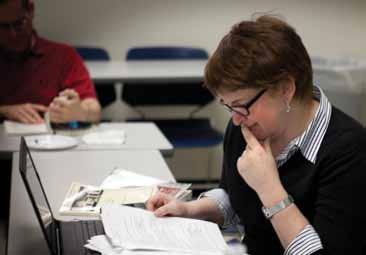
College of Education assistant professor donald bolger tells his master’s students not to rule anything out. This is because the primary organ in his field of study, the brain, can continually change and alter itself. bolger, who studies how learning and reading occur in the brain comments, “we’ve entered a new era of understanding when it comes to the brain. we’ve learned that many areas of the brain are working together when we perform specific tasks like reading, writing and speaking, and because all of these areas are working in tandem the brain has an amazing ability to compensate for lost or injured tissue by rerouting its pathways, if needed.” bolger is referring to the idea of plasticity, which can lead to dramatic changes in a person’s brain map. it is plasticity that is responsible for the right lateralization of language, normally a function of the brain’s left hemisphere, in children who have lost the left hemisphere of their brain due to tumors or lesions.
The idea that multiple areas of the brain are at work when we read, speak or write is what bolger hopes to convey to his students, many of whom are certified secondary school teachers in montgomery County. his driving point is that as practicing teachers and students of human development, they should look beyond the traditional diagnoses of reading
disabilities and pay attention to the types of problems their students are having. “so my approach has been to say keep digging. Keep seeing what else and what other types of processes or computations or skills that a child needs to have in order to read c-a-t as the word “cat” and put it together with its meaning. don’t just stop at the letter and the sounds, but think about what types of attentional capacities are needed to put the entire reading process together.”
processes like hearing, working memory, understanding the relationship between the spelling and the sound, as well as how the brain acquires the meaning of words, all come into play when a child reads and can be helpful to consider when remediation is needed. “i tell my students that each student in their classroom has a different set of skills. from my perspective if they have 35 students, they have thirty five different brains that they have to contend with. These brains have different experiences or lack of experiences and each one may need help in a slightly different way.”
bolger’s steadfast approach to individualized reading intervention, coupled with a strong assessment of the student’s skills comes from his undergraduate years at the university of massachusetts. while there, bolger worked in a lab that studied reading ability and disability and provided children with a particular type of reading intervention. he says, “i worked a lot on letter sounds. you know doing word lists that consist of the word families—cat/hat/fat/sat.” his first student was a thirteen year old boy who was reading at a fifth grade level. “his parents had come to us in desperation. he was still in a special education school, and i had been told by his parents that the light was going out in his eyes.”
after working with bolger using an intervention coupled with a reward system that the lab developed, the student was placed in a mainstream classroom receiving high marks one year later. for bolger, his student’s response to intervention was proof that reading disabilities can improve with hard work and the appropriate techniques. This idea, however, ran counter to the research being published at the time claiming that reading disabilities were biological and that children with these disabilities would never be able to read normally. bolger adds, “i’ve seen personally that if you intervene, children can rebound and recover.”
as an affiliate faculty member at the Center for advanced study of language (Casl), bolger’s current research project explores the phenomenon of brain training. with this study, he and a cohort of university of maryland faculty are looking at the effects of cognitive training on the brain specifically when participants are asked to engage daily in 15 to 30 minutes of working memory exercises over a course of five weeks. he’s been responsible for the brain imaging portion of the project using the fmRi scanner in the university’s new maryland neuroimaging Center. bolger’s
team takes a brain image before and after the five weeks of training. “we’re looking for changes in the activation of the brain areas. what areas change? we’re also looking at not just kind of the patterns of activation, but if these regions change structurally. are these areas growing? we measure the white matter (fatty tissue that forms the insulation on the neurons allowing them to transmit faster) to see if these fiber pathways are better insulated because of this workout.”
in addition to his extensive research on the brain and learning, bolger teaches classes on cognitive development and learning, as well as cognitive neuroscience in the College’s human development and quantitative methodology department. he has several professional affiliations including the society for Cognitive neuroscience, the society for the scientific study of Reading and the organization for human brain mapping. he was the co-pi on the national science foundation grant that brought a $2 million dollar fmRi to the university of maryland and has been an ad-hoc reviewer for several academic journals. –sy
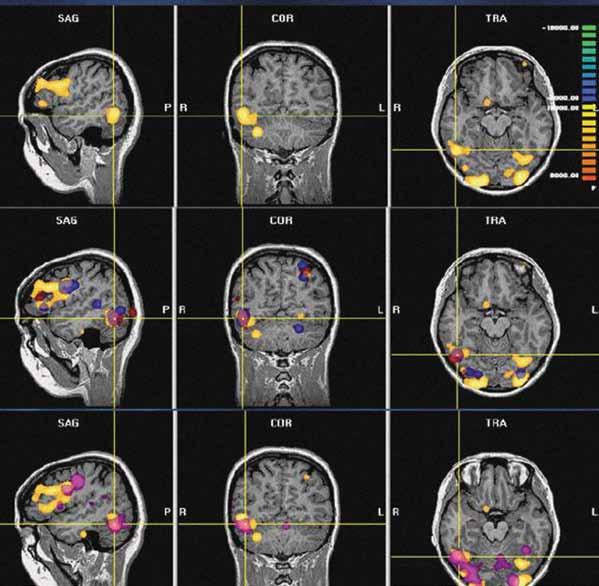
…reading disabilities can improve with hard work and the appropriate techniques.

“Teaching word patterns, teacher read-alouds to model fluency, and small group reading lessons are only some of the techniques employed at the College of Education’s Summer Reading Clinic.”
whEn niColE Ziadi was lEaRning To REad over twenty years ago, she learned like many of us. she learned to memorize the pronunciation and spelling of words. but now, as a future Reading specialist, she’s learning and employing strategies that will make reading easier for her kindergarten and first grade students. “in the clinic, we teach students things like word patterns. if i knew when i was younger that certain words are all spelled the same it would have made reading, writing and spelling much easier.” Teaching word patterns, teacher read-alouds to model fluency, and small group reading lessons are only some of the techniques employed at the College of Education’s summer Reading Clinic. The summer Reading Clinic is the capstone teaching experience for maryland students earning their m.Ed. in Reading Education and preparing to receive a Reading specialist Certification.
The clinic, held for five weeks during the summer, is a learning experience for both teacher and student. for the teachers, there is the unique opportunity to practice co-teaching in a classroom environment. as future reading specialists, students in the program will serve as the resident expert on reading in their home school. in addition to overseeing all aspects of the school’s reading curriculum, they will also find themselves co-teaching classes or helping other teachers teach reading better. Therefore, Reading specialists are often engaged in the professional development of their colleagues — a role usually left to a school administrator. because Reading specialists-in-training need to understand how to advise other teachers on their lesson planning as well as classroom teaching style, the summer Reading Clinic was designed to provide this type of experience.
“one thing we ask our teachers to do is coach each other,” comments dr. ayanna baccus, visiting assistant professor in the department of Teaching and learning, policy and leadership, and the Clinic’s co-director. “in order for this to really occur we pair them up. This means they have the opportunity to see one another teach. They plan together, they make notes together, they make suggestions about a student’s reading development together.”
The days for the eighty-five students enrolled in the summer reading program are filled with age appropriate strategies for deciphering the nuances of language that become second nature by adulthood. although the students are divided up by grade level, the nature of the program remains the same for everyone. dr. baccus explains further, “Every single day in our program a child will read a book in small group of three with their teacher. They will also do a writing lesson, read independently and listen to the teacher during a read aloud.” Each reading model has its benefits. for example with the small group reading lessons, the teacher is able to prepare the student for the text they are about to encounter. Teachers work with the students to conjure up their background information about the text’s subject or simply discuss the book’s cover or pictures. once the student begins reading out loud, the teacher is able to listen in and help them utilize strategies like word study or contextual clues to decipher the words they don’t understand. The added benefit for both teacher and student is that the classrooms are small, often with two teachers for eight to ten students, so each student gets individual attention and teachers are able to complete their lesson planning.
The summer Reading Clinic was first developed in the 1970s and its pedagogical roots take into consideration the theories behind selfdetermined readers. The clinic aims to create an environment where students begin to take control of their own reading agenda and become more confident and reflective with the reading in which they engage. in order to foster a self-determined reader, teachers at the clinic must work on creating a safe environment for students where they can “feel better about themselves and are encouraged to take risks,” comments dr. Codling, the clinic’s co-director. The students are free to read what they want during their independent reading time, and if they can’t decide the teacher will provide them with reading-level appropriate texts that match their interests. it also means promoting a culture in which no questions are too obvious and that learning to master a subject involves making mistakes along the way. although the unique design of the summer Reading Clinic has remained the same over the years, the m.Ed. program in Reading Education has changed. “we’ve revamped some of our courses,” says dr. Codling. “we learned from some howard County teachers that reading specialists need to understand data. They need to know how to work with it and explain it. so we created a class called Understanding, Evaluating and Using New Research in School Reading Programs.” This year, the program also injected a new focus on English language learners into their core curriculum. This focus on Ell stems from the surrounding neighborhood the clinic is often held in, as many of the students are English language learners. when asked to sum up her experience in the m.Ed. Reading program as a student and a teacher, it only takes nicole Ziadi a moment to reflect. she goes back to the co-teaching. “i’ve been with my cohort since ’09 and really gotten to know them well. They have been a great resource for me. we just share and coach each other on teaching strategies. in my own class, i’ve applied program strategies and ideas from other teachers in the class. like, ‘oh this works really well for me, you should try it, sort of a thing.’” –sy






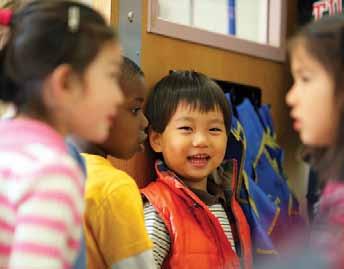

aftEr yEars of planning, countless committee meetings, College-wide votes, and university approval processes, the College reorganization from seven to three departments became official over a year ago. since then, College faculty, staff and students have been working hard to ensure the goals of the reorganization – mainly fostering more inter- and cross-disciplinary collaboration – are coming to fruition. while the process of reorganization was challenging, the real work of creating a College that is world-renowned for its research, its faculty and its students, is really just beginning. faculty are revamping existing programs and creating entirely new ones that are responsive to the changing demands in the education work space. departments are beginning to hire new faculty who are reflective
of the new focus on interdisciplinary approaches to research. The College is looking at its existing institutes and Centers to bolster and amplify their research effect and outreach.
while the structure of the departments may have changed, the quality of the programs has not. The College will continue to expand understanding of how individuals learn over a life time and develop techniques to overcome roadblocks to learning. graduates of the College of Education will continue to enter their respective fields highly skilled, creative and committed to improving educational outcomes for all. The College will continue to take a lead in shaping this world.
Counseling, higher Education and special Education concentrates on the preparation of counselors, school leaders, student development and international leaders who work in a variety of educational environments in the u s. and abroad. The department offers innovative leadership programs in higher education and disability studies, as well as programs preparing leaders, researchers and practitioners in pK-20 education.
foRmERly ThE dEpaRTmEnTs of CounsEling and pErsonnEl sErviCEs, spECial EduCation, and HigHEr EduCation.
Teaching and learning, policy and leadership’s programs encourage thoughtful and responsive explorations of education policies, practices and related social issues. graduates are prepared to create and critique alternative courses of action to enhance the quality of education for all persons and to redress the social conditions that restrict collective democratic aspirations.
foRmERly ThE dEpaRTmEnTs of CurriCuluM and instruCtion and EduCation poliCy studiEs.
human development and quantitative methodology advances knowledge and practice through research on human neuroscience; learning, cognitive and language development; social and emotional development and socialization; and measurement, statistics and evaluation. programs provide high level training in human development theory and in measurement, statistics and evaluation.
foRmERly ThE dEpaRTmEnTs of HuMan dEvElopMEnt and MEasurEMEnt, statistiCs and Evaluation.
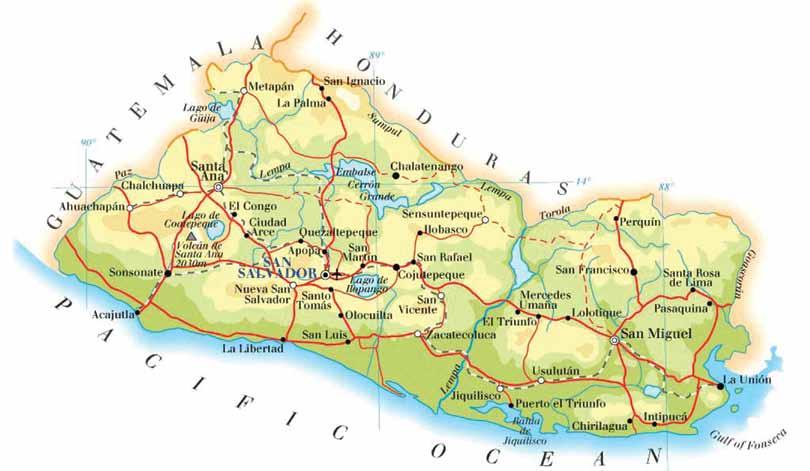
in the bed of a pick-up truck in el salvador, dr. Paula Beckman wrote a grant to improve educational outcomes for the salvadorian people. on a visit to the country after a series of devastating earthquakes in 2001, dr. Beckman met two teachers in a small village where 80% of the home were destroyed. when asked what they needed, the women teachers responded that even though they only had a small amount of education, the parents in the village were depending on them to teach the village’s children. they needed to learn how to teach. inspired by this need, dr. Beckman wrote a grant proposing a model to train teachers. this teacher training is now occurring in 20 rural el salvadorian villages.
years later, dr. Beckman designed a study abroad course for the college through the university’s education abroad program. since 2009, students have traveled over winter term to the central american nation, visiting schools, living with salvadorian families and learning about the culture. they also bring books and work with villagers to establish after-school programs for children and classes for adults on literacy, computers, art, and english in

three community centers. “one of the things i am proudest of is that students from the university of maryland, through this study aboard experience have started three separate after-school/library/education programs that are now functioning,” says dr. Beckman. their continuing efforts help promote education in a nation where children often drop out of school by third grade and families commonly struggle to survive on $300 a year.
visit http://ter.ps/elsalvador to watch a video of the El salvador program and learn more about dr. beckman’s inspiration to make a difference in El salvador.
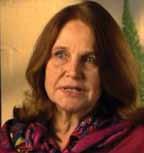


the College of Education is proud to announce that brent Edwards has been awarded the fulbright research scholarship. brent is a doctoral student in the international Education policy program in the College of Education. in september 2011, brent travelled to El salvador to begin his fulbright year collecting data for his dissertation. below he shares some background on his experiences in El salvador and his plans for his year as a fulbright.
i first traveled to El salvador in 2009 as part of the College of Education’s winter term study abroad program. i became interested in the processes of education policy formation in El salvador. i was particularly interested in the complicated relationships between the range of actors—from the local to the global level—involved in these reforms. in El salvador, both national actors, such as salvadoran research centers, representatives from the ministry of Education, and political figures, as well as international actors, including the world bank, usaid, harvard university, and international non-governmental organizations are involved in educational development.
during my year as a fulbright, i will research the three major instances of education policy formation that have taken place since the end of the
civil war in 1991. more specifically, i will focus on and trace the initiative to decentralize education management, which has been central to reformation of the education system in El salvador since the early 1990s. Thus, in studying education reform in El salvador, i will focus on the tensions among the global, national, and local levels in the adoption, implementation, and continuation of the decentralization program (known as EduCo).
by pulling the thread of decentralization, i hope to be able to produce insights into the way in which education policy is formed in developing countries. because these processes have involved actors from the community level to the global level, the analysis inherently contains a vertical dimension. The idea is to trace and unpack these processes and to problematize the roles of the range of actors involved.
Education is essential to national and economic development and is always at the center of development strategies. at the same time, in the current context of globalization, we see that more and more actors from outside a given country partake in and shape the way in which those education policies are formed. my research will draw attention to—and help to understand—the way in which this happens in El salvador. –bE

donna Jensen, ba ’94, Ma ’96 has not led a “traditional life.” since graduating from a high school in west Texas, mrs. Jensen embarked on a career that took her all over the country and even the world. working first for the air force and then the university of maryland university College, mrs. Jensen has lived in places like oklahoma, las vegas, dallas, heidelberg, and bahrain, to name just a few. she had made amazing strides in her career – and did it all without an undergraduate degree. and even though her successful career speaks for itself, mrs. Jensen viewed her lack of degree as “unfinished business” and always had a strong personal desire to complete a degree program; a desire that became ever more urgent with each passing year.
after returning from bahrain in 1990, her personal goal became too urgent to ignore. living in lanham, maryland, a mere six miles from College park, mrs. Jensen, then age 36, decided to jump in feet first and go for it. mrs. Jensen enrolled at the university in the spring of 1994 to study speech and secondary education. Even though she was worried about the age difference between herself and the rest of the undergraduate students, mrs. Jensen soon found the university of maryland to be home. so much so, that after completing her undergraduate degree in 1994, she started a master’s program in English secondary Education in the College of Education.
as she was pursuing her degrees, mrs. Jensen worked as a student advisor in the College’s office of student services. after completing her master’s degree, she was offered a full time position as the head of advising for the former department Curriculum and instruction (now under Teaching and learning, policy and leadership). she worked in the department until she retired in 2000.
her experiences at the university of maryland, the students she worked with as an advisor, and her commitment to education inspired her and her husband to create a scholarship for the College. when she and her husband began their estate planning, she knew that she wanted to leave a legacy with the university of maryland. “i loved the university and it made my gift planning decision very easy. Through our bequest, i hope to affect the lives of some students, just as they affected me,” says mrs. Jensen.
Through perseverance, commitment and courage, mrs. Jensen accomplished one of her most important life goals. she hopes that her scholarship, designated to assist students who are returning to college, will serve as an inspiration to persevere. says Jensen, “an education is very important, and this scholarship is a testament that you are never too old to go back to school.”
what kind of legacy would you like to leave? if you are interested in finding out more information about deferred gifts or estate plans, please contact ms. Regina Tracy at rtracy@umd.edu or 301-405-4568.
a word of thanks from Jason garvey, a fifth year doctoral student in the College student personnel administration program and recipient of the naomi Hertz Memorial fund scholarship.
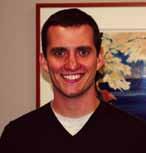
Through the generous giving of donors, i am able to pursue my dream of becoming a faculty member. my research and teaching seek to emancipate students and give voice to underrepresented communities. without the support of the College of Education scholarship, this would not have been possible. The scholarship has enabled me to use my time more productively and concentrate on my publications and teaching portfolio.
being chosen for a College of Education scholarship has reaffirmed my belief in reciprocal giving to benefit others. Just as many donors have supported me and other students, i hope one day to be able to contribute to another’s educational career and professional development through my philanthropy. i am deeply indebted to those who continue to support students, particularly within the fields of education.
tHE last yEar of tHE largEst Capital CaMpaign ever undertaken by the university of maryland has come to an end. The College has been working hard to fulfill its share of the ambitious $5 billion goal. Thanks to the efforts of our faculty and staff and through the generous support of our alumni and friends, the College has raised close to $12.9 million and has exceeded its goal. have you thought about how you want to make your mark on maryland? whether it is supporting student scholarships, faculty research, or building

renovations, your investment in the College will go a long way. gifts both small and large have a tremendous impact on the programs and people of the College. making a gift today, ordesignating a gift to be realized in the future, will ensure that you leave a legacy of generosity that will never be forgotten.
visit the College’s Campaign priorities page to learn more about giving to the College or make a secure donation online at http://ter.ps/coegiving.


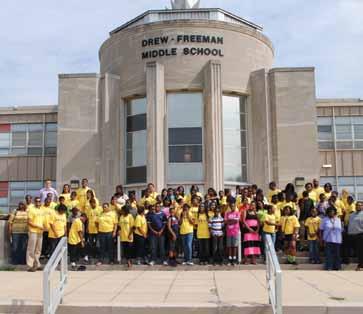

“five, four, three, two, one…” group of drew freeman middle school students leads the countdown to each rocket launch. The excitement of the students is contagious as each rocket shoots into the air. These students are part of the drew freeman summer sTEm academy and have learned and applied the fundamentals of newton’s Third law. The rockets, built by the students, were just one of the many hands-on engineering projects that the students worked on during the summer experience.
drew freeman middle school in prince george’s County, a recent turn-around school, created the sTEm academy with the assistance of the College’s maryland science and math Resident Teacher program (msmaRT). msmaRT serves high needs districts in prince george’s County by recruiting career changers and recent college graduates who are committed to and have the potential to effectively teach middle grades mathematics and science to a diverse student body. The incoming cohort of msmaRT students served as the teachers for the sTEm academy, providing them with an immediate hands-on experience of their own.
The sTEm academy was created to provide a vehicle for helping middle school-level students make connections between the four areas of sTEm (science, technology engineering and math) learning. The activities incorporated all three learning domains — cognitive, affective

and psychomotor — to create an extension of the academic curriculum in which students can apply these subjects through engineering to create an integrated whole.
learn more about the MsMart program here: http://ter.ps/MSMArt

Keep in touch! submit your classnotes via email to endeavors@umd.edu or on the College of Education’s website: http://ter.ps/COEKIT

thomas novotny (bs ’62) was inducted into the 2012 howard County Community sports hall of fame.
virginia s george (bs ’69) received the honorary alumna Recognition award from alfred university.
dr. bernice r sandler (phd ’69) was featured on Espn’s The Power of IX Legends, celebrating the anniversary of this landmark occasion.
sharon p levin (MEd ’72) is the head of school for Jack m barrack hebrew academy in bryn mawr, pa
dr. delores C. datcher (MEd ’74) was honored with the 2012 verizon Community innovator award at verizon’s black history month celebration.
Christine a. Edwards (ba ’74) was awarded the 2012 Transformative leadership award by insideCounsel which recognizes women general counsels who are catalysts for change.
John Enkiri (MEd ’78) retired after 40 years of service as an educator and administrator in prince george’s County public schools system.
dr. diane M. gayeski (phd ’79, Ma ’75) was honored by the international association of business Communicators Research foundation with its lifetime foundation friend award.
dr. dana E. friedman (Ma ’79) was honored with the nassau boCEs Education partner award bestowed annually on those whose impact on public education in nassau county, ny
dr. ted d spring (phd ’79) was appointed as president of Cape fear Community College in wilmington, nC.
dr. barbara b. Hines (phd ’81) was named the 2012 outstanding woman in Journalism and mass Communication by the association for Education in Journalism and mass Communication.
William E. slezak (bs ’82) was appointed as vice president of healthcare for north america at the umf Corporation.
sarah b. andrus (Ma ’86) was honored by the direct selling Education foundation (dsEf) with its Circle of honor award, the highest honor bestowed upon those sowing outstanding service and commitment to dsEf
dr. kimberly Hoagwood (phd ’87) was appointed as the Cathy & stephen graham professor and vice Chair for Research of the department of Child and adolescent psychiatry at nyu langone medical Center.

dr. Jose M. ortiz (Edd ’88) was named Chancellor of peralta Community College district in oakland, Ca.
Jean Marie thompson (bs ’94) was appointed as head of school for the island school in boca grande, fl
leah Carol geiger (MEd ’97) received the faculty Excellence award from the College of southern maryland.
dr. Jacqueline leonard (phd ’97) was appointed as director of the university of wyoming’s science and mathematics Teaching Center.
dr. kevin Carroll (MEd ’99) was appointed as Executive director of behavioral health at iowa health system in des moines.
Christine E. ground (MEd ’99) was honored as the 2012-2013 maryland Teacher of the year for montgomery County public schools.
dr. denise f noldon (phd ’98) was appointed as president of Contra Costa College.
dr. lynn d darling (phd ’00, MEd ’95) was appointed as director of mississippi state university’s Early Childhood institute.
tara l.r. beziat (ba ’02) recently graduated from Kent state university with a ph.d. in Educational psychology and will be teaching at the university of south Carolina at aiken in fall 2012.
dr. paul E. pitre (phd ’02) was appointed to the future of flight foundation’s board of directors. future of flight uses commercial aviation to inspire innovative thinking in exploring solutions to critical global issues.
dr. Michelle asha Cooper (phd ’06) was recognized by the black women’s agenda for outstanding contributions to advancing, securing and protecting the rights of black women and their families.
dr. danette gerald Howard (phd ’07) was appointed as the secretory of maryland higher Education Commission.
aeriel anderson (MEd ’09) was appointed as assistant dean and pan-asian and asian american advisor in the office of pluralism and leadership at dartmouth university.


3119 benjamin building university of maryland College park, maryland 20742-1121 www.education.umd.edu
Entrepreneurialism, MooCs, fearless ideas…get to know more about the College from the perspective of the dean. dean wiseman has created a blog to provide an inside look at some of the projects she is working on and her reactions to the latest trends in education. it’s just one more way to stay connected with the College. please visit: http://ter.ps/deansblog